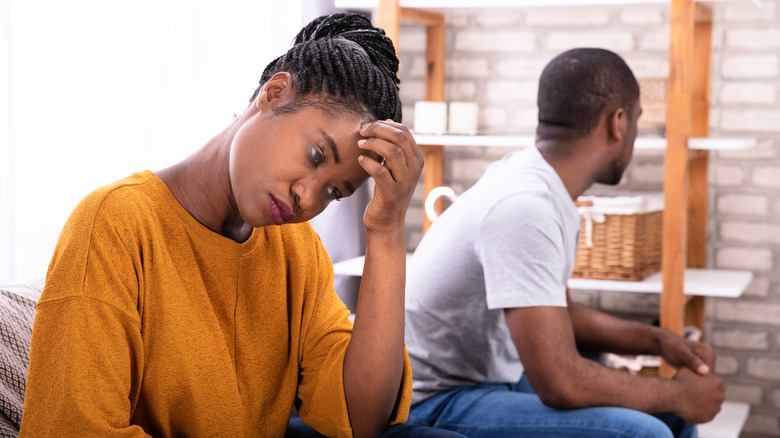Neuropsychologist Tells Us When Anxiety Becomes A Disorder - Exclusive
Most of us experience stress and/or anxiety at some point in our week, but how do you know if you're experiencing something more than what's considered normal? Overcoming the physical toll of anxiety can be hard enough as it is, but knowing when and if you should seek out professional help can be especially difficult to determine. Even worse, between things like inflation, layoffs, and the political climate, there are rising stress levels across the country. This can make it even more difficult to know if your anxiety is simply a natural part of life or a more serious condition requiring help and/or potential interventions.
Between navigating lingering stigmas surrounding mental health issues and battling your anxiety, it can be difficult to identify if your anxiety is serious enough to need additional care. Women.com spoke exclusively with NYC Neuropsychologist and Director of Comprehend the Mind, Dr. Sanam Hafeez to discuss ways you can tell if your anxiety is entering disruptive territory and what you can do about it.
Duration and persistence
Dr. Sanam Hafeez exclusively told us that one of the key ways to distinguish experiencing regular anxiety from having an anxiety disorder centers on how long and how frequently you experience the anxiety. "Feeling anxious in certain situations or temporarily experiencing anxiety is a normal response to stress or challenging circumstances. However, with an anxiety disorder, the anxiety persists over time and may occur without an immediate threat or trigger," Dr. Hafeez explained.
If you're experiencing added stress from a specific event or project, chances are that your anxiety will lessen once the precipitating trigger passes and it isn't something that needs to be looked into. However, if you find yourself still experiencing anxiety without these triggers, or find that the anxiety you're experiencing is interfering with your well-being, it might be worth deeper consideration. Dr. Hafeez explained, "It can be chronic and ongoing, interfering with various aspects of life." If you're still unsure about your level of anxiety, it can be helpful to start tracking your anxiety triggers to better understand what kinds of factors are contributing. While stressing about work or school can be normal, increased anxiety around smaller, more innocuous, things (like household chores for instance) could be a sign your anxiety is more serious.
Severity and intensity
Another way to help you determine the seriousness of your anxiety is to analyze just how severely you experience it. Dr. Sanam Hafeez elaborated, "While everyone experiences anxiety at times, individuals with anxiety disorders often experience heightened and intense levels of stress that go beyond what is considered normal." An important thing to remember about anxiety is that it can cause much more damage than simply making you worry. The Mayo Clinic reports that severe and prolonged anxiety can complicate and even worsen other mental or physical conditions you might have, and can lead to substance misuse, depression, chronic pain, a decline in your quality of life, and even suicide if left untreated.
Dr. Hafeez elaborated on some specific symptoms and physical side effects that can happen as a result of an anxiety disorder: "It may lead to severe distress, panic attacks, and physical symptoms such as rapid heart rate, sweating, trembling, or shortness of breath." The presence of any of these physical symptoms is a sign that your anxiety might be at a more extreme intensity level than what is considered normal.
Impact on your daily life
Perhaps one of the most significant ways to gauge the severity of your anxiety is to analyze if and how it might be impacting your everyday life. "Anxiety disorders can significantly impact a person's daily functioning and quality of life. They can interfere with relationships, work or school performance, social activities, and overall well-being," explained Dr. Hafeez. It's also important to recognize that there are a variety of different anxiety disorders, per the NHS, including panic disorders, agoraphobia, obsessive-compulsive disorder, separation anxiety, and even post-traumatic stress disorder so your anxiety (and how it manifests in your life) might look different than someone else's.
While it can be normal to feel anxiety about normal life occurrences, especially in your workplace or school, it's important to recognize if that anxiety is staying with you when you're no longer there. If you find yourself unable to let go of your anxieties or are having difficulties concentrating, you might need to talk to a doctor. Other signs of a more serious anxiety condition include increased irritability, getting or feeling tired more easily, feeling restless or on edge, and difficulty falling or staying asleep. These symptoms can all have major impacts on almost every element of your life and can negatively impact you and the people who are most important to you.
What you can do about your anxiety
"Managing anxiety doesn't always require professional help, but it can be beneficial. A mental health professional can provide an accurate diagnosis, offer guidance and tools for managing anxiety, and a treatment plan for your specific needs," Dr. Hafeez explained. The process for determining if you do, in fact, have an anxiety disorder is incredibly thorough and includes multiple assessments and steps to ensure a proper diagnosis.
If you do end up being diagnosed, it's important to remember that it is treatable. Dr. Hafeez elaborated, "Generalized anxiety disorder (GAD) and panic disorders are chronic mental health conditions, but it's important to note that they are highly treatable, and many people can experience significant improvement and lead fulfilling lives with appropriate interventions." While it can be difficult for some to come to terms with having an anxiety disorder (and even more difficult if your loved ones just don't understand), it's incredibly important to have all the information you can about your experience in order to help you manage your symptoms.
Dr. Hafeez also added that while symptoms "may persist or recur over time, effective treatment and self-management strategies can help individuals manage their symptoms and reduce their impact on daily life." Finding a mental health professional and/or treatment plan that works best for you and a support system to help you through difficult times is key to ensuring your anxiety doesn't consume your life.




